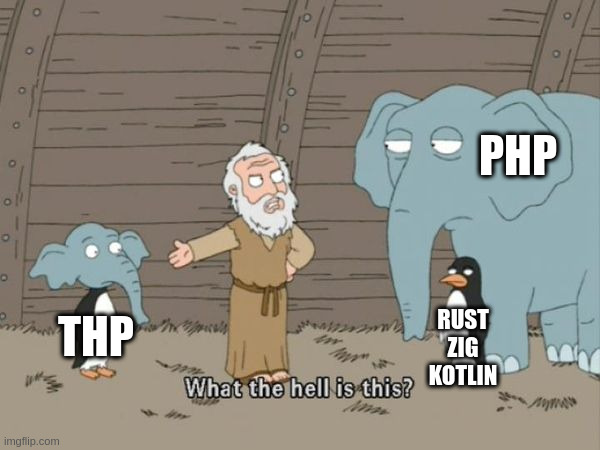Welcome
Welcome to the documentation of the THP programming languague.
THP is a new programming language that compiles to PHP.

This page details the main design desitions of the language, if you want to install THP go to the installation guide
This set of pages contain ideas, designs and features that are not implemented,
and may not be implemented. To see the status of the actual implementation,
see an actual version (e.g v0.0.1).
Why?
PHP is an old language. It has been growing since 1995, adopting a lot of features from many places like C, Perl, Java, etc. This was done in a very inconsistent way, as detailed by Eevee in their article PHP: a fractal of bad design.
Along the years PHP has been improving. PHP added classes, exceptions, interfaces, traits, type hints and checks, functional features, reflection, etc., etc. However, by building on top of the existing language without a clear design philosophy, and by keeping backwards compatibility, we ended up with a messy language. The article above goes into detail about this.
In spite of this, PHP has remained widely used and loved, in a weird way (I’d say in the same way that people love JavaScript), and at the time of writing PHP 8.3 is available. However, PHP is to my eyes fundamentally flawed, and cannot get up to date without completely breaking what came before.
This is where THP comes in. I wanted a modern language that could run in the same environment that PHP does. And I quickly realized that building on top of PHP in the same way that TypeScript did for JavaScript would be detrimental. It would be better to create a completely new language, treat PHP source code as a “low level” compilation target, and focus entirely on the new language.
This new language would be mainly inspired by what I consider the best designed languages out there: Rust as a baseline, Zig for its null and error handling and Kotlin for its OOP features. In a way, PHP will be adapted to, say, Rust’s syntax and semantics, instead of having Rust adapt to PHP.
In pursue of this THP will ditch many things about PHP,
in name of consistency. These are things that PHP devs are
used to doing, but that I consider bad practices, hacks or
workarounds. One example of this are variable variables on PHP:
$$variable.
Another critical point of THP is type safety. It is a goal
to approach the same level of type safety that have compiled
languages like Java/Go/Rust, and leave aside dynamic typing
as much as possible. Types cannot be turned off, you cannot
use Any to avoid typechecking, and so on.
Finally, there are some additions to the language that I consider essential today: A good, unified LSP, type definitions, accesible documentation, an opinionated code formatter and plugins for major editors like VSCode and Neovim.
Goals
- Bring static typing to PHP: Generics, type checks at compile and runtime, etc.
- Reduce implicit type conversion to a minimum.
- Remove the inconsistencies in the language.
- Organize the PHP stdlib.
- Have a clear distinctions between Arrays, Tuples, Maps and Sets.
- Implement Union types
- Create a consistent language.
- Have typings for popular libraries (like TS’s
.d.ts). - Have a simple instalation and configuration (requiring just Composer or a binary).
- Ship a blazingly fast, native binary,
written in Rustnow rewritten in Zig!. - Support in-place compilation.
- Implement a Language Server.
- Implement an opinionated code formatter.

Not goals
These are not things that THP wants to solve or implement
- Be what TypeScript is for JavaScript (PHP with types).
- Strictly adhere to PHP syntax/conventions.
THP intentionally uses a different syntax from PHP to signal that it is a different language, and has different semantics.
Some differences with PHP
// PHP
$has_key = str_contains($haystack, 'needle');
print("has key? " . $has_key);
// THP
val has_key = haystack.contains("needle")
╰╴Invalid variable declaration
print("has key? " ++ has_key)
thp- Explicit variable declaration
- No
$for variable names (and thus no$$variable, use a map instead) - No semicolons
- Use methods on common datatypes
- Strings use only double quotes
- String concatenation with
+
// PHP
$obj = [
'names' => ['Toni', 'Stark'],
'age' => 33,
'numbers' => [32, 64, 128]
]
// THP
val obj = .{
╰╴Invalid variable declaration
names: #("Toni", "Stark"), // Tuple
age: 33,
numbers: [32, 64, 128]
}
thp- Tuples, Arrays, Sets, Maps are clearly different
- JSON-like object syntax
// PHP
$cat = new Cat("Michifu", 7);
$cat->meow();
// THP
val cat = Cat("Michifu", 7)
╰╴Invalid variable declaration
cat.meow()
thp- Instantiate classes without
new - Use dot
.instead of arrow->syntax
// PHP
use \Some\Deeply\Nested\Class
use \Some\Deeply\Nested\Interface
// THP
╰╴No statement matched
use Some::Deeply::Nested::{Class, Interface}
thp- Different module syntax
- Explicit module declaration
- PSR-4 required
- No
include,include_once,requireorrequire_once
Other things:
- Pattern matching
- ADTs
Runtime changes
Where possible THP will compile to available PHP functions/classes/methods/etc.
For example:
// This expression
val greeting =
╰╴Invalid variable declaration
match get_person()
case Some(person) if person.age > 18
{
"Welcome, {person.name}"
}
case Some(person)
{
"I'm sorry {person.name}, you need to be 18 or older"
}
case None
{
"Nobody is here"
}
thp// Would compile to:
$greeting = null;
$_person = get_person();
if ($_person !== null) {
if ($_person["age"] > 18) {
$greeting = "Welcome, " . $_person["name"];
}
else {
$greeting = "I'm sorry " . $_person["name"] . ", you need to be 18 or older";
}
}
else {
$greeting = "Nobody is here";
}
However, more advanced datatypes & helper functions will require a sort of runtime (new classes/functions/etc) or abuse the language’s syntax/semantics.